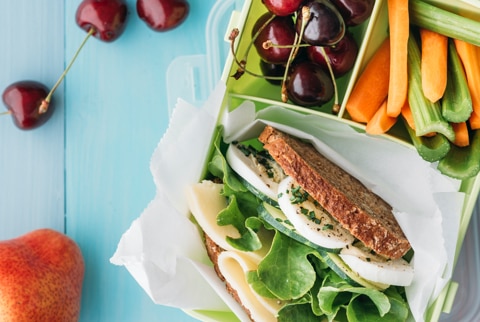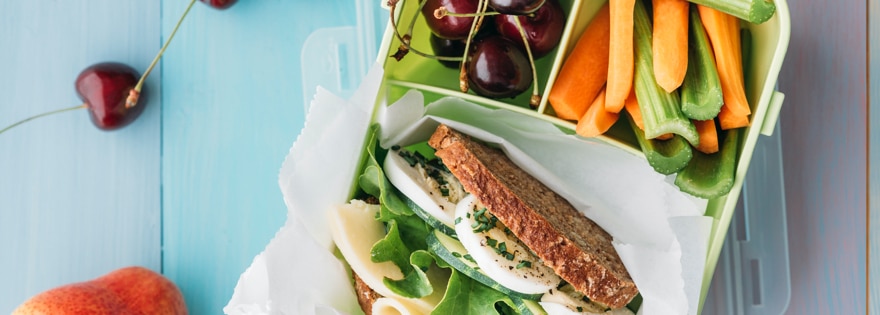

For parents, “back-to-school” can often feel like “back-to-germs.” Thankfully, a few small changes to your daily routine can help support your child’s immune system and make a big difference to their health.
Prepare a healthy breakfast
 A healthy breakfast is one of the best ways to get a headstart on your child’s immune health. Nutrition plays a key role in your immune system, and a balanced breakfast can contain the vitamins, nutrients, antioxidants and protein needed to support your child’s developing immune system.1
A healthy breakfast is one of the best ways to get a headstart on your child’s immune health. Nutrition plays a key role in your immune system, and a balanced breakfast can contain the vitamins, nutrients, antioxidants and protein needed to support your child’s developing immune system.1
Immune-supporting breakfasts for kids:
- Citrus fruits: Citrus fruits such as oranges or grapefruits are rich in vitamin C and have anti-inflammatory and antioxidant properties.
- Yogurt: Yogurt is not only a great source of protein, it is a source of vitamin D. Yogurt is also full of probiotics, which can help maintain good health. Try topping your child’s yogurt with berries, granola, or chia seeds for extra healthful nutrients.
- Frittata muffins: A crustless quiche can be made in muffin tins beforehand and reheated for a healthy, on-the-go breakfast. Add spinach and red bell peppers for an extra dose of vitamin C.
Limit sugar
Many prepackaged snacks for children are loaded with sugar – even the ones that claim to be healthy. And while they’re an easy way to keep kids munching quietly, the excessive amounts of sugar can have detrimental effects on their immune systems.
In fact, studies have shown that a high sugar intake reduces immune cell activity due to less vitamin C entering into the cells.2 Try swapping high-sugar snacks like brownies or cookies for fruit, which contains healthy, naturally-occurring sugars that also contain vitamins, minerals and fiber. Or, try making a batch of homemade, low-sugar snacks such as these bliss balls, or these healthy oat cookies.
Keep ‘em hydrated
Our bodies are made up of approximately 70% water, and require regular intake in order to maintain its everyday functions. This is especially true for growing children and teens; not only does water help remove harmful toxins from the body, it helps carry oxygen to the cells to ensure they are working optimally.
However, dehydration in children is relatively common. Many children don’t realize they need water until they are nearly, or already, dehydrated.
Tips for helping kids stay hydrated:
- Let them pick out a fun water bottle for them to carry with them
- Add frozen fruit or fun-shaped ice cubes
- Teach them about what their urine looks like when they’re hydrated, and have them help judge their hydration levels after using the toilet
Note: Thirst is just one sign of dehydration. To find out if you or your child could be dehydrated and not know it, read this.
Manage stress
As children and teens get older, the stress from school can start to take its toll. In fact, analysis from hundreds of research reports indicate that stressful events are reliably connected with changes in the immune system.
When you’re stressed, the body’s ability to fight off antigens is reduced, making it more susceptible to infections. The stress hormone, corticosteroid, can also suppress the effectiveness of the immune system by lowering the number of white blood cells.3
The American Psychological Association reports that managing stress – especially long-term stress, even if it’s not intense – can help maintain a healthy immune system.4 Helping your children and teens learn healthy stress-management techniques should be as important as making sure they take their vitamin C. Set an example by not overscheduling after-school activities, encouraging time unplugged from electronics, and prioritizing a good night’s sleep.
Help them catch those Z’s
Helping your child get a good night’s sleep does more than give you a minute to yourself (although that’s important too). Sleep exerts a strong influence on immune function.5 While getting more sleep won’t necessarily boost a healthy immune system, twin studies have shown that not getting enough sleep can suppress the immune system.6
Children should be getting anywhere from 8-12 hours of sleep a night, depending on their age.7
How to help kids get quality sleep:
- Unplug: Encourage teens to charge their phones outside of the bedroom overnight to prevent late-night scrolling and exposure to harmful blue light.
- Stick to a strict bedtime schedule: Going to bed at the same time each night will not only make bedtimes easier, but it will improve the quality of sleep.
- Relax: Make the hour before bedtime as relaxing as possible. Avoid television and screens, and try reading bedtime stories or drinking a cup of soothing warm milk instead.
Introduce supplements
While a healthy diet should always come first, some children are picky eaters, and making sure they are getting the required vitamins and minerals can be a struggle. Giving your children vitamins and supplements is a great way to fill in the gaps and help them get the vitamins and nutrients their immune systems need.
Our favourite immune-supporting supplements for kids:
Vitamin C
Vitamin C is an important vitamin for immune health. While it is abundant in fruits and vegetables such as oranges, elderberries, or red bell peppers, giving your child a chewable vitamin C supplement is an easy way to help support their immune health.
Ester-CⓇ 250 mg Chewable is a less-acidic form of vitamin C, in a smaller dose for children, and is available in two delicious flavours: orange and wildberry.
Kids Cold & Flu Rescue with Ester-CⓇ: These easy-to-chew, wildberry-flavoured tablets contain a unique combination of Echinacea, zinc, vitamin C, vitamin A and beta carotene to help fight off infections, especially of the upper respiratory tract. Echinacea was traditionally used in herbal medicine to help relieve cold symptoms.
Sisu U-Cubes Vitamin C are delicious, naturally-sweetened pectin-based gummies that offer 125 mg of vitamin C per serving to your little one. They contain no added sweeteners, colours, or flavours, and are 100% vegan, non-GMO, gluten-free, dairy-free, and soy-free.
Calcium & vitamin D3
Sisu U-Cubes Calcium & D3 are delicious, naturally-flavoured pectin-based gummies that are coated with organic beet sugar. Each serving contains 125 mg of calcium and 3.75 mcg of vitamin D3, and helps support your little one’s immune system while supporting strong bones and teeth as well. They’re also 100% vegan, non-GMO, gluten-free, and soy-free.
Multivitamins
Sisu U-Cubes Multi offer a range of essential vitamins and minerals including vitamin C, D, and zinc. Each serving helps support the immune system, builds strong bones and teeth, and more. These delicious, naturally-flavoured pectin-based gummies are 100% vegan, non-GMO, dairy-free, and gluten-free.
Mini Vits: These star-shaped, happy-faced multivitamins are an antioxidant for good health, and are a fun way to support your child’s immune system without having to force them to finish their vegetables.
Teens Multi: Your adolescents have different health needs than children and adults, so it makes sense that they have their own unique multivitamin. Sisu’s Teens Multi helps to maintain immune function, and is packed with vitamins such as vitamin Bs, C, D, zinc, and more.
 Prioritize your health, too
Prioritize your health, too
While your child’s health is probably your number one priority, make sure you are taking the necessary measures to maintain your own immune system’s health as well, so that you can be your best self for your child.
There’s a whole world of nutrition and supplement knowledge you may not know about. Sign up for our newsletter now to stay up to date with the latest information in health and wellness. (We know the struggle of a busy inbox, so we’ll only send you one a month.)
Always read and follow the label. Products may not be suitable for everyone.
1 https://www.ncbi.nlm.nih.gov/pmc/articles/PMC3737458/
2 https://www.ghrnet.org/
3 https://www.simplypsychology.org/
4 https://www.apa.org/research/action/immune
5 https://www.ncbi.nlm.nih.gov/pmc/articles/PMC3256323/
6 https://www.sciencedaily.com/releases/2017/01/170127113010.htm
7 https://www.aboutkidshealth.ca/article?contentid=645&language=english

